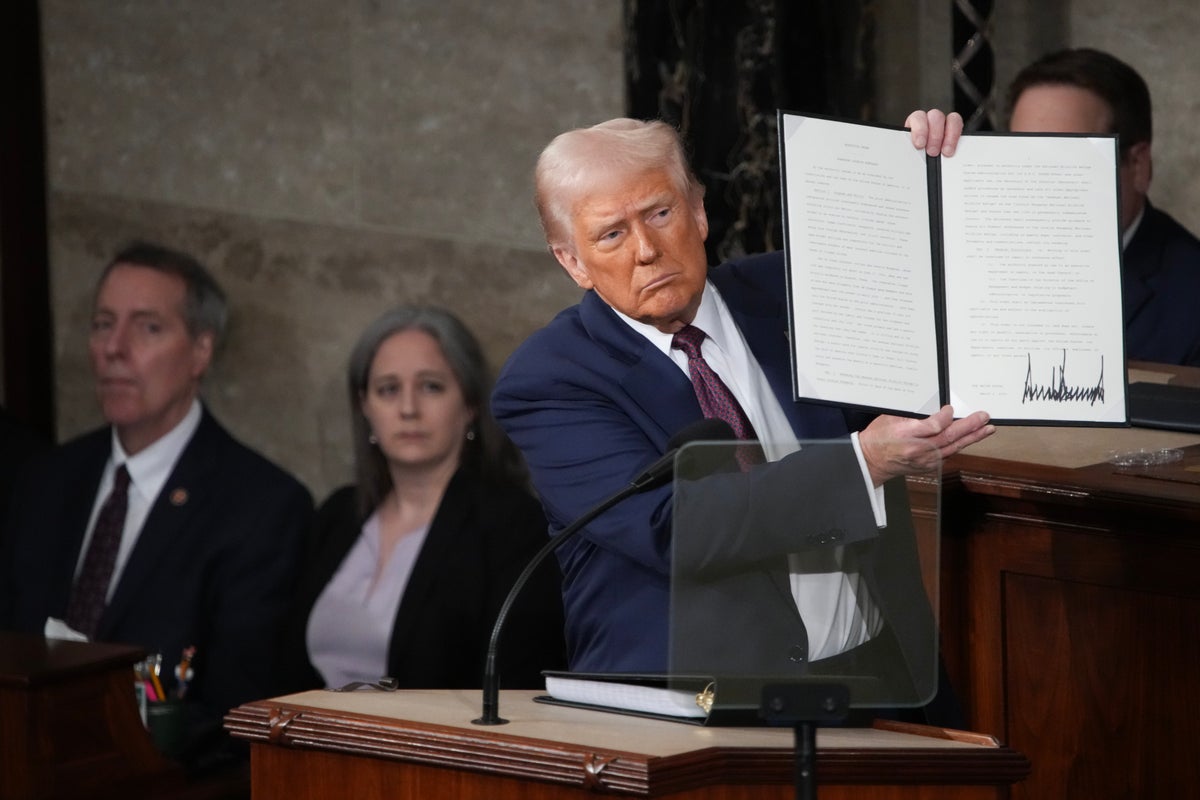
President Donald Trump could invoke a centuries-old law that would authorize him to deploy the United States military to assist law enforcement in carrying out his domestic policies.
The Insurrection Act of 1807, a rarely used law, allows the president to utilize federal military troops or federalize National Guard troops in order to suppress uncontrollable protests or other civil disturbance situations.
In recent months, Trump has deployed National Guard troops to several Democrat-run cities, including Los Angeles, Chicago, and Washington, D.C., in a move local leaders oppose and say is meant to stir up unrest and justify the military and federal law enforcement occupation of American cities.
Trump, on Monday, said he would invoke the Insurrection Act “if it was necessary,” but “so far it hasn’t been necessary,” telling reporters: “But we have an Insurrection Act for a reason.”
“If I had to enact it, I didn’t. I do that if people were being killed … and courts were holding us up, or governors or mayors were holding us up, sure, I do that,” he said. “I mean, I want to make sure that people aren’t killed. We have to make sure that our cities are safe.”
Trump’s comments come a day after a federal judge blocked the president from sending National Guard troops to Portland, Oregon, which he has claimed, without evidence, to be a “war-ravaged” city taken over by left-wing “domestic terrorists.” The president has faced lawsuits from California, Illinois, and now Oregon over the deployments, which Illinois Gov. J.B. Pritzker said Monday served as a “pretext” for invoking the Insurrection Act.
The lawsuits also argue that Trump is violating the Posse Comitatus Act of 1878, which prohibits the military from enforcing domestic law, as well as 10th Amendment protections ensuring that police authority rests with the states, not the federal government. Invoking the Insurrection Act would suspend the Posse Comitatus Act.
Illinois Attorney General Kwame Raoul noted that Trump’s inflammatory statements targeting Pritzker and Chicago officials “demonstrate this is not at all about an emergency. This is a political targeting, utilizing our military.”
As Trump continues to threaten sending National Guard troops into American cities, here is what to know about the Insurrection Act of 1807.
What is the Insurrection Act of 1807?
When invoked, the Insurrection Act gives the president the authority to deploy the U.S. military or National Guard inside the country to suppress events such as rebellion, insurrection and civil disorder or to enforce the law in a situation where it has become “impracticable” to do so.
The Insurrection Act is not one piece of legislation; rather, it is the combination of a series of laws enacted by Congress between 1792 and 1871 that specifically address utilizing the military within the U.S.
The act is an exception to the Posse Comitatus Act, which typically prevents the federal government from using the federal military or National Guard to enforce domestic policies. Once invoked, the act temporarily suspends Posse Comitatus.
Troops can be deployed under three sections of the Insurrection Act.
The first is if a state legislature or governor requests federal aid to suppress an insurrection in that state.
The second allows the president to invoke it without a state’s permission whenever they consider “unlawful obstructions, combinations or assemblages, or rebellion” make it “impracticable to enforce the laws of the United States.”
The third also allows the president to invoke the act without a state’s permission under two scenarios. If “any insurrection, domestic violence, unlawful combination or conspiracy” hinders the state’s ability or desire to execute laws that specifically protect people’s constitutional rights. Or if “any insurrection, domestic violence, unlawful combination or conspiracy” obstructs the executive of the law or course of justice under those laws.
But before the president can consider the Insurrection Act, they first must order a proclamation asking insurgents or those obstructing the enforcement of laws to disperse peacefully within a certain amount of time.
Why does Trump want to use it?
The president has broadly sought to utilize the extent of his authority to circumvent the traditional, slow-paced steps to enact his policies.
He has also never been shy about his desire to utilize federal troops or the National Guard to control mass protests in states where he feels the governor is not doing enough to restore order.
Over the past few months, Trump has surged federal law enforcement into several Democrat-led cities, including Los Angeles, Washington, D.C., Chicago and Memphis.
In June, Trump and his allies referred to protesters opposing Immigration and Customs Enforcement raids in Los Angeles as “insurrectionists” and floated the idea of invoking the act.
Trump has long said he would be open to invoking the act if needed, and previously threatened to do so during his first term during the George Floyd protests, according to the New York Times.
At one campaign rally in Iowa in 2023, Trump complained about crime in states with Democratic governors.
“And one of the other things I’ll do — because you are not supposed to be involved in that, you just have to be asked by the governor or the mayor to come in — the next time, I am not waiting,” Trump said.
Trump even admitted while campaigning in 2024 that he would use the law to suppress unrest, according to Politico.
Has it been used before?
The act has been invoked at least 30 times throughout history, with the most recent occurrence being in 1992 when George H. W. Bush sent active-duty troops into Los Angeles after citywide unrest following the acquittal of four white officers in the alleged assault of Rodney King.
Some notable applications of it are when Abraham Lincoln invoked the Insurrection Act at the start of the Civil War after Southern states began seceding.
Dwight D. Eisenhower invoked it after the Arkansas National Guard forbade Black students from attending school in Little Rock. Eisenhower used his power to call down the Arkansas National Guard, allowing the children to go to school.
